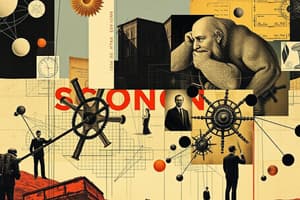Podcast
Questions and Answers
What did Freud believe was the main difference between neurotic people and earlier psychiatrists' views?
What did Freud believe was the main difference between neurotic people and earlier psychiatrists' views?
- Working hardware vs. entirely faulty software
- Faulty software vs. entirely faulty hardware (correct)
- Faulty hardware vs. entirely working software
- Working software vs. entirely faulty hardware
What was one of Freud's significant contributions to psychology and psychiatry?
What was one of Freud's significant contributions to psychology and psychiatry?
- Promoting the idea of purely organic explanations
- Emphasizing the search for organic causes
- Reinforcing the distinction between sane and insane
- Introducing the concept of Oedipal crisis (correct)
How did Freud's theories differ from those of his predecessors regarding neurosis?
How did Freud's theories differ from those of his predecessors regarding neurosis?
- He emphasized physical diseases over mental health
- He supported the idea of fully diseased brains in neurotic individuals
- He believed in resolving early childhood traumas through physical treatment
- He focused on inner psychic conflicts instead of organic causes (correct)
What was Charcot's view on hysteria's causes compared to Freud's view?
What was Charcot's view on hysteria's causes compared to Freud's view?
How did Freud challenge the traditional view of the line between sane and insane?
How did Freud challenge the traditional view of the line between sane and insane?
What was one of the key shifts in psychology and psychiatry as psychoanalysis gained popularity?
What was one of the key shifts in psychology and psychiatry as psychoanalysis gained popularity?
In terms of mental health, how did Freud differentiate between 'insane' people and 'sane' people?
In terms of mental health, how did Freud differentiate between 'insane' people and 'sane' people?
What perspective did Freud adopt in contrast to his predecessors regarding mental health issues?
What perspective did Freud adopt in contrast to his predecessors regarding mental health issues?
'Everyone has an Oedipal crisis' is an idea that contributed to which aspect according to Freud's perspective?
'Everyone has an Oedipal crisis' is an idea that contributed to which aspect according to Freud's perspective?
'Purely organic explanations' were rejected by Freud due to their focus on what aspect?
'Purely organic explanations' were rejected by Freud due to their focus on what aspect?
Study Notes
Technology and Society
- Technology is the application of science and creation of systems, processes, and objects designed to help humans in their daily activities.
- Development of science and technology has brought immense progress in society and individuals.
- Scientific knowledge and technology influences individuals and society.
Importance of Science, Technology, and Society
- Understanding of science, technology, and society is essential to know the unique attributes of each enterprise and their implications for society.
- Science, technology, and society is important to the public because it helps address issues and problems that are of concern to the general population.
- Scientific and technological principles have been and continue to be applied to solve problems that people experience in their day-to-day aspects of living.
Interrelationship of Science, Technology, and Society
- Figure 1 shows the interrelationship of science, technology, and society.
Historical Timeline of Science and Technology
- Ancient Times to 600 BC: Advent of Science
- 600 BC to 500 AD: Islamic Golden Age
- Ancient China and the Far East
- Renaissance
- Enlightenment Period
- Industrial Revolution
- 20th century
- Fourth Industrial Revolution
Copernican Revolution
- Nicolas Copernicus was a Polish scholar who wrestled with the problem of planetary orbits.
- He proposed a heliocentric universe, placing the sun at the center of the universe, reducing the number of epicycles from 80 to 34.
- His book, Concerning the Revolutions of the Celestial Worlds, published in 1543, laid the foundations for a revolution in how Europeans viewed the world and its place in the universe.
Johannes Kepler
- Johannes Kepler was a brilliant mathematician who compiled more data that tarnished the perfection of the Ptolemaic universe.
- He used Tycho Brahe's observations to develop his own theories.
Freud's Theory of Neurosis
- Freud rejected the purely organic explanations of his predecessors, claiming that neurotic people had working hardware but faulty software.
- He claimed that everyone had an Oedipal crisis, and everyone could potentially become mentally ill.
- Psychoanalysis became popular, and psychology and psychiatry turned away from the search for organic causes and toward the search for inner psychic conflicts and early childhood traumas.
Studying That Suits You
Use AI to generate personalized quizzes and flashcards to suit your learning preferences.
Description
Learn about the influence of science and technology on individuals and society, and how it has brought progress in various aspects of life. Explore the unique attributes of science and technology enterprises and their implications for society.




